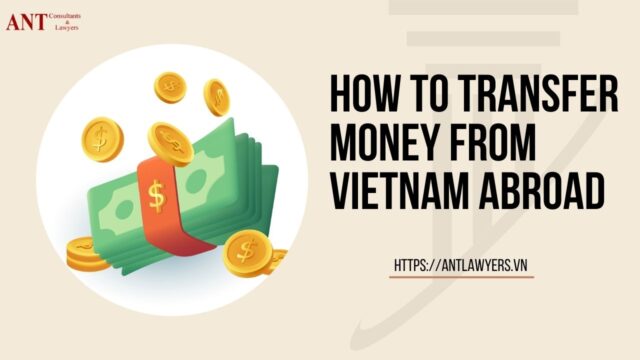How and When Transferring Money from Vietnam Abroad?
Why How to Transfer Money from Vietnam Abroad a Matter?
In the context of international economic integration, more and more foreign investors are coming working and or investing in Vietnam.
They as individuals receiving salary would transfer money home for supporting family, or making payment for maintaining services to their home, utilities in their home country.
If foreigner investors invest in Vietnam and set up company, the companies might transfer money abroad to pay for services, goods they acquire for business operation.
Besides, many Vietnamese individuals and organizations have also implemented many activities i.e studying, traveling, using medical services… abroad.
Therefore, there are needs to transfer money from Vietnam abroad for various purposes.
But, in many cases, individuals or companies in Vietnam can not just make international transfer. This seems strange for many people whom are new to Vietnam.
Right, in many countries in the world, if you have bank accounts and positive balance, you could wire money anywhere after paying a small fee.
This is not the case for Vietnam. That is why how to transfer money from Vietnam abroad is a matter of concern.
For the control of the State Bank of Vietnam, the transfer money from Vietnam abroad has to be made through bank transfer at banks in Vietnam.
Not only that, not all international transfer are just a click a way. There are processes which the banks need to look into details of the purpose of the transfer, the support documents to approve the international transfer.
The key of the matter is having the legal and appropriate purposes of international transfer and then prepare supporting documents that fit with such.
In the following, we will discuss the legal and appropriate purposes to address how to transfer money from Vietnam abroad and legal implications for not following the laws of such in Vietnam
Cases When Money Could be Transferred Abroad from Vietnam?
According to the provisions of Vietnamese laws on foreign exchange management, individuals and organizations are allowed to transfer money abroad in the following cases:
For individuals being Vietnamese citizens, they are entitled to buy, transfer or bring foreign currencies overseas according to the State Bank’s regulations for the following purposes: to study and receive medical treatment abroad; traveling; business trip; visiting abroad; to pay charges and fees to foreign countries; allowances for relatives members living abroad; transfer of inheritance money to overseas heirs; transfer money in case of permanent residence abroad; one-way money transfer for other legitimate needs.
For companies, foreign owned or Vietnamese owned, they are allowed to transfer money from Vietnam abroad when performing the following cases:
Carry out payment and transfer money related to the import or export of goods and/or services;
Make payments and remittances related to commercial credits and short-term bank loans;
Make payments and transfers related to direct and indirect investment income;
Transfer money when being allowed to reduce direct investment capital;
Make payment of debts and interest of foreign loans;
Make one-way money transfers; payment and other remittance according to regulations of the State Bank of Vietnam.
What Are Legal Implication of Violation of Transferring Money Abroad?
Transferring money abroad from a country with foreign exchange control policies with the intention of avoiding capital outflow restrictions can have serious legal implications. These implications can vary depending on the specific laws and regulations of the country involved, but some common legal consequences might include:
Violation of Foreign Exchange Regulations:
Most countries with foreign exchange controls have regulations in place to manage the movement of funds across borders. Transferring money in violation of these regulations can lead to fines, penalties, or legal action.
Financial Penalties:
Governments may impose significant financial penalties on individuals or entities found to be in breach of foreign exchange control policies. These penalties can be substantial and may far exceed the amount of money attempted to be transferred.
Criminal Charges:
In some cases, transferring money abroad in violation of foreign exchange controls can be considered a criminal offense. Individuals involved could face criminal charges, which might result in fines, imprisonment, or both.
Confiscation of Funds:
Authorities may have the power to confiscate the transferred funds, especially if the transfer is deemed illegal. This could result in a complete loss of the transferred amount.
Blacklisting:
Individuals or entities involved in illegal capital flight might be blacklisted by the government, which can have wide-ranging consequences including difficulty in conducting business, obtaining loans, or engaging in other financial transactions.
Damage to Reputation:
Being involved in activities that violate foreign exchange control regulations can damage an individual’s or a company’s reputation, making it difficult to establish trust with financial institutions, business partners, and other stakeholders.
Legal Proceedings:
Governments may initiate legal proceedings to recover the funds that were transferred in violation of foreign exchange controls. This can lead to costly and time-consuming legal encounters.
Civil Lawsuits:
Individuals or entities negatively affected by the illegal transfer might take legal action to seek compensation or restitution.
International Agreements:
If the country has international agreements or treaties related to financial crimes and money laundering, there could be cross-border legal cooperation, leading to further complications.
It’s important to note that the specifics of the legal implications will depend on the country’s laws, regulations, and the nature of the transaction. Before attempting to transfer money abroad to avoid capital outflow restrictions, individuals and entities should seek legal advice from professionals who are well-versed in the relevant laws and regulations of both the originating and receiving countries.
About ANT Lawyers, a Law Firm in Vietnam
ANT Lawyers, a law firm in Vietnam helps clients overcome cultural barriers and achieve their strategic and financial outcomes, while ensuring the best interest rate protection, risk mitigation and regulatory compliance. We have lawyers in Ho Chi Minh city, Hanoi, and Danang, and will help customers in doing business in Vietnam.
Source: https://antlawyers.vn/library/transfer-money-from-vietnam-abroad.html






0 nhận xét: